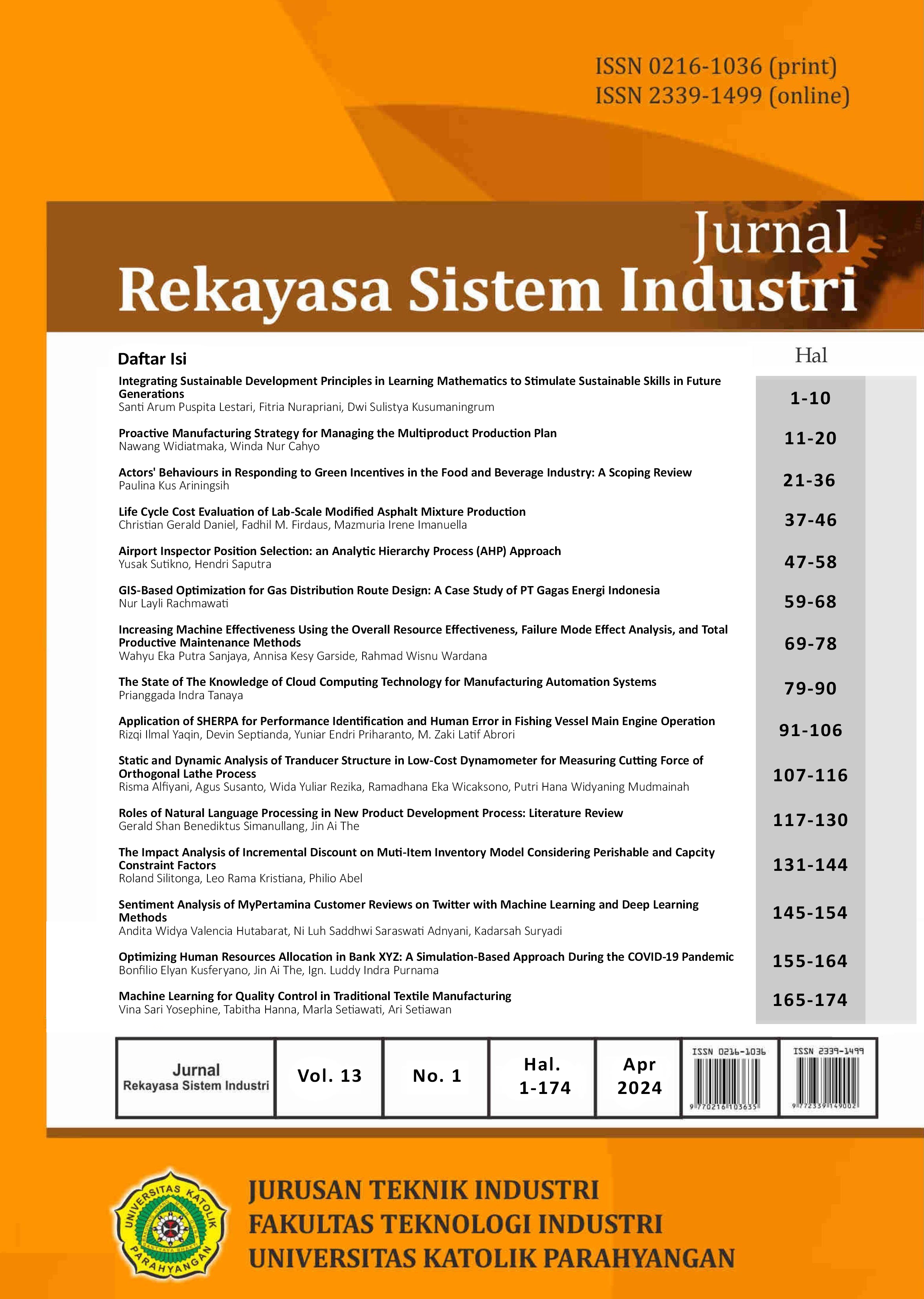Integrating Sustainable Development Principles in Learning Mathematics to Stimulate Sustainable Skills in Future Generations
DOI:
https://doi.org/10.26593/jrsi.v13i1.7167.1-10Keywords:
Sustainable Development, Education Sustainable, Sustainable Skills, Learning MathematicsAbstract
This research constitutes a literature review employing a qualitative approach, analyzing scholarly articles, books, and other documents related to sustainable development. This article aims to summarize and analyze previous studies concerning sustainable development in the context of mathematics education, as well as strategies that can be employed to integrate the principles of sustainable education. Integrating the principles of sustainable development into education, including mathematics education, is crucial in fostering a more environmentally responsible society and promoting sustainability across all sectors. However, its implementation remains limited. Educators face various challenges, including a lack of time, resources, and understanding of sustainable education, along with a dearth of supportive teaching materials. The principles of sustainable development can serve as a framework for developing curricula and teaching practices that are more sustainable. Educators can select mathematical problems related to environmental or social issues, discuss relevant mathematical concepts in connection with these problems, and help students comprehend the impact of mathematical decisions on the environment and society. Integrating the principles of sustainable development into mathematics education not only aids in producing a generation with sustainable skills but also motivates students to learn mathematics in more engaging and meaningful ways. A learning approach centered around sustainable development can be an effective way to prepare students for a sustainable future. The article also underscores the necessity for curriculum development, training, and professional advancement for educators.
References
Anggraeni, Y., Abdulhak, I., & Rusman, R. (2019). The Development of Mathematics Curriculum to Increase The Higherorder Thinking Skills in The Sustainable Development Goals (SDGs) Era. WoMELA-GG. https://doi.org/10.4108/eai.26-1-2019.2282915
Clarisa, G., Danawan, A., Muslim, M., & Wijaya, A. F. C. (2020). Penerapan Flipped Classroom dalam Konteks ESD untuk Meningkatkan Kemampuan Kognitif dan Membangun Sustainability Awareness Siswa. Journal of Natural Science and Integration, 3(1), 13. https://doi.org/10.24014/jnsi.v3i1.8953
Darwati, I. M., & Purana, I. M. (2021). Problem Based Learning (PBL) : Suatu Model Pembelajaran Untuk Mengembangkan Cara Berpikir Kritis Peserta Didik. Widya ACCARYA: Jurnal Kajian Pendidikan FKIP Universitas Dwijendra, Vol 12 N0(1), 61–69.
Díez-Palomar, J., de Sanmamed, A. F. F., García-Carrión, R., & Molina-Roldán, S. (2018). Pathways to Equitable and Sustainable Education Through the Inclusion of Roma Students in Learning Mathematics. Sustainability, 10(7), 1–16. https://doi.org/10.3390/su10072191
Dwijayani, N. M. (2019). Development of Circle Learning Media to Improve Student Learning Outcomes. Journal of Physics: Conference Series, 1321(2). https://doi.org/10.1088/1742-6596/1321/2/022099
Garg, D. K. (2023). Enviromental Challenges and Sustainable Development. Journal Global Values, XIV(Special Issue), 203–210.
Hsiao, P. W., & Su, C. H. (2021). A Study on the Impact of STEAM Education for Sustainable Development Courses and Its Effects on Student Motivation and Learning. Sustainability, 13(7), 1–24. https://doi.org/10.3390/su13073772
Ismail, S. N., Muhammad, S., Omar, M. N., & Shanmugam, S. K. S. (2022). the Practice of Critical Thinking Skills in Teaching Mathematics: Teachers’ Perception and Readiness. Malaysian Journal of Learning and Instruction, 19(1), 1–30. https://doi.org/10.32890/mjli2022.19.1
Jeong, J. S., & González-Gómez, D. (2020). Adapting to PSTs’ Pedagogical Changes in Sustainable Mathematics Education Through Flipped E-Learning: Ranking Its Criteria with MCDA/F-DEMATEL. Mathematics (Vol. 8, Issue 5). https://doi.org/10.3390/MATH8050858
Joutsenlahti, J., & Perkkilä, P. (2019). Sustainability Development in Mathematics Education-A Case Study of What Kind of Meanings Do Prospective Class Teachers Find for The Mathematical Symbol "2/3 "? Sustainability, 11(2), 1–15. https://doi.org/10.3390/su11020457
Khatimah, H., Utami, R. D., & Sari, I. N. (2019). Dodo (Domino Ludo); Sarana Pendidikan Karakter Berbasis Pembelajaran Tematik Pada Diri Anak Sekolah Dasar Di Era Sustainable Development Goals. Jurnal Pena, 3(2), 11.
Lestari, S. A. P. (2019). Pengembangan Instrumen Asesmen Higher Order Thinking Skill (HOTS) pada Materi Himpunan Kelas VII SMP. JKPM (Jurnal Kajian Pendidikan Matematika), 4(2), 111–120. https://doi.org/10.30998/jkpm.v4i2.3862
Pasichnyk, N., Rizhniak, R., Krasnoshchok, I., Botuzova, Y., & Akbash, K. (2020). Construction of Theoretical Model for Sustainable Development in Future Mathematical Teachers of Higher Education. Universal Journal of Educational Research, 8(5), 2079–2089. https://doi.org/10.13189/ujer.2020.080546
Rahadian, A. H. (2016). Strategi Pembangunan Berkelanjutan. Prosiding Seminar STIAMI, III(01).
Santamaría-Cárdaba, N., Martins, C., & Sousa, J. (2021). Mathematics Teachers Facing the Challenges of Global Society: A Study in Primary and Secondary Education in Spain. Eurasia Journal of Mathematics, Science and Technology Education, 17(4), 1–9. https://doi.org/10.29333/ejmste/10806
Tambunan, H. (2019). The Effectiveness of the Problem Solving Strategy and the Scientific Approach to Students’ Mathematical Capabilities in High Order Thinking Skills. International Electronic Journal of Mathematics Education, 14(2), 293–302. https://doi.org/10.29333/iejme/5715
Vásquez, C., Seckel, M. J., & Alsina, Á. (2020). Belief System of Future Teachers on Education for Sustainable Development in Math Classes. Uniciencia, 34(2), 1–30. https://doi.org/10.15359/RU.34-2.1
Vintere, A. (2018). A Constructivist Approach to the Teaching of Mathematics to Boost Competences Needed for Sustainable Development. Rural Sustainability Research, 39(334), 1–7. https://doi.org/10.2478/plua-2018-0001
Widodo, A., & Wiyatmo, Y. (2017). Pengembangan Media Pembelajaran Buku Saku Digital Berbasis Android untuk Meningkatkan Minat dan Hasil Belajar Fisika Peserta Didik Kelas XI SMA N 1 Jetis Pada Materi Pokok Keseimbangan Benda Tegar. Jurnal Pendidikan Fisika, 6, 148.
Woo, Y. L., Mokhtar, M., Komoo, I., & Azman, N. (2014). Education for Sustainable Development A Review of Characteristics of Sustainability Curriculum. OIDA Internacional Journal of Sustainable Development, 3(8), 33–44. http://papers.ssrn.com/sol3/papers.cfm?abstract_id=2031102

